
| Publisher: | Simon & Schuster | |
| Genre: | Humorous, Political, Fiction, Satire, Literary | |
| ISBN: | 9781476772233 | |
| Pub Date: | December 2014 | |
| Price: | $26 |
| Starred | Fiction |
by Steve Israel
Brandishing biting wit and a Washington insider's perspective, U.S. Congressman Steve Israel (New York) takes aim at the United States' global war on terror--revealing true casualties--in his hilariously shrewd first novel.
Pharmaceutical salesman Morris Feldstein walks the straight and narrow in his tediously routine life. He avoids conflict at all costs and follows the philosophy "don't make waves." Victoria D'Amico is a recently single, lonely receptionist on Morris's sales route. She lures Morris--who is in a rare state of weakness--to lunch and seduces him into a single, pitiful illicit rendezvous. Thanks to a zany chain of innocent encounters, the government is scrutinizing Morris even before he reaches the seedy motel. Spies and surveillance systems feed misinterpreted information about Morris into a supercomputer that determines he is a serious threat to national security. Morris Feldstein's routine life is turned upside down with no sign of being righted.
Israel's wicked sense of humor highlights the absurdity of his subject matter, down to setting descriptions: "Landscaping trucks sat on the sides of the road like infantry vehicles in an army of occupation, a foreign legion of immigrants impressed into lawn-to-lawn combat in the global war on dandelions." Readers will doubtlessly find analogs to Israel's exaggerated characters among their coworkers, neighbors, maybe even family.
Like his salesman protagonist, Israel has something to pitch: the belief that Americans must stop allowing fear to govern them. His obvious conviction for this idea propels him to alter Morris's philosophy: "Be selective; make the right waves." The Global War on Morris is the right wave. --Jen Forbus of Jen's Book Thoughts
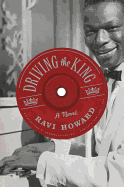
| Publisher: | Harper | |
| Genre: | General, Fiction, Historical, African American | |
| ISBN: | 9780060529611 | |
| Pub Date: | January 2015 | |
| Price: | $25.99 |
| Starred | Fiction |
by Ravi Howard
Smooth and easy, Nat King Cole's baritone captivated listeners of all races when he began performing at jazz clubs as a teenager in the 1930s. By the mid-1950s, Cole was a star, and though he was living in Los Angeles, he returned to his home state of Alabama to play a sold-out concert. During the show, Cole was assaulted on stage by three white men. In his second novel, Driving the King, Ravi Howard uses that incident as inspiration, imagining what might have happened afterwards.
Howard (Like Trees, Walking) creates a vivid fictional narrator in the person of Cole's childhood friend Nat Weary. Recently returned from fighting in World War II, Weary comes to Cole's show with his girlfriend, planning to propose to her while Cole serenades them. When Cole's attackers rush the stage, Weary leaps from the "colored" balcony to protect his old friend and is sentenced to 10 years in prison. Just before his time is up, Weary gets a message: the singer wants Weary to come to Los Angeles and work as his driver and de facto bodyguard.
Howard's narrative cuts back and forth in time, beginning with Cole and Weary's return to Montgomery for another show in 1956 and unfolding in a series of flashbacks. Weary's voice rides as smoothly as the pristine Packard he drives for Cole, mixing straightforward talk and folksy metaphors that never veer into cliché. Howard weaves Weary's life story into the narrative of the civil rights movement. As Weary builds a new life for himself in L.A. and Cole struggles to keep his TV show on the air without sponsors, both men must deal with the frustrating reality of being black and male (albeit educated and gainfully employed) in the era of Jim Crow. Powerful but understated, Driving the King resembles the top-shelf liquor Weary prefers: smooth and rich with a surprising bite. --Katie Noah Gibson, blogger at Cakes, Tea and Dreams
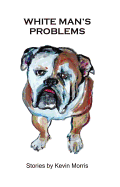
| Publisher: | Black Cat | |
| Genre: | Fiction, Short Stories (single author) | |
| ISBN: | 9780802123886 | |
| Pub Date: | January 2015 | |
| Price: | $15 |
| Fiction |
by Kevin Morris
In the story collection White Man's Problems, Kevin Morris so masterfully captures the universal angst of his characters it doesn't really matter that his world of white guy lawyers or blue-collar Irish Catholics doesn't reflect the demographics of most of the rest of the world. He is equally adept describing a Malibu lawyer sailing down the Pacific Coast Highway in his Mercedes as he is a suburban Philadelphia working-class Vietnam vet's wake, where "the men had thick necks and jowls and mustaches, and almost every one of them was in his only suit, polyester with pleats... bought on sale at Penney's or Boscov's." A Los Angeles media lawyer and occasional contributor to the Wall Street Journal and Huffington Post, Morris knows these people.
Sometimes funny, brutally on the money, each of the nine stories in Morris's first fiction collection tracks a white man on the edge--uneasy with his family, his job, his life. Like the first-year legal associate in "Starting Out" who discovers that it's not enough that "he played rugby and went fly-fishing and had bona fide real-man credentials at a time when young men were being called metrosexuals" or the over-stretched Brentwood deal-maker who accidently backs over his family dog in "Mulligan's Travels," each Morris character in some way is "losing his battle to stay fit, which meant losing the battle to stay sharp and distinct, which meant wending his way to old age and dying." Bleak, perhaps, but this is also the work of a major new fiction talent. --Bruce Jacobs, founding partner Watermark Books & Cafe, Wichita, Kan.
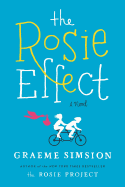
| Publisher: | Simon & Schuster | |
| Genre: | Humorous, General, Fiction, Romance, Family Life | |
| ISBN: | 9781476767314 | |
| Pub Date: | December 2014 | |
| Price: | $25.99 |
| Fiction |
by Graeme Simsion
At the end of Graeme Simsion's debut novel, The Rosie Project, the brilliant, socially inept genetics researcher Don Tillman had found true love in spite of his algorithm-driven, carefully calibrated Wife Project. When The Rosie Effect opens, Don and his free-spirited spouse, Rosie, are living happily in New York City, where Rosie is a medical student and Don is a visiting scholar at Columbia University. Marriage has added significant complexity to Don's life, and when Rosie tells him she's pregnant, Don realizes that this will generate a long and complicated list of challenges.
Tackling the obstacle in his trademark logical style, Don attempts to conduct research on pregnancy and prepare himself for fatherhood. Before long, however, Don's actions lead to apprehension by the police, an unplanned apartment move, the risk of deportation and a professional scandal. Don tries to keep his troubles a secret from Rosie, but his lack of joy at her announcement and his clumsy attempts to prepare for parenthood cause a rift in their relationship. Determined to solve his problems (which are multiplying as quickly as his baby's cells), Don employs a few innovative (not to say desperate) ploys to win back Rosie's affections, prove he's ready to become a father and save his reputation.
Simsion again employs the wacky, wonderful voice that made The Rosie Project a hit; the true pleasure here lies in the gap between Don's perceptions and his increasingly complex reality. Heartwarming, poignant and often hilarious, The Rosie Effect is a worthy second chapter in Don and Rosie's story. --Katie Noah Gibson, blogger at Cakes, Tea and Dreams

| Publisher: | Amistad | |
| Genre: | Fiction, Cultural Heritage, Literary | |
| ISBN: | 9780062348135 | |
| Pub Date: | January 2015 | |
| Price: | $24.99 |
| Fiction |
by Dimitry Elias Léger
Dimitry Elias Léger's debut novel, God Loves Haiti, takes place in the days just before, during and after the devastating earthquake that struck Port-au-Prince in 2010. Those 35 seconds, coupled with the mayhem and aftershocks that followed, killed hundreds of thousands, but among the survivors are a politically important old man, a vibrant younger one and the woman who has recently chosen between them but still struggles with her choice. Natasha is an artist, deeply passionate about her painting, though she's also passionate about the poet Dante, her religion and the politics and business that engross her husband and her boyfriend. All three have different relationships to the colorful Haitian community, which is epically short on resources for everyday life, let alone a disaster of these proportions. All three choose and experience different paths after the quake hits.
Asking big questions is part of Léger's charm, but although subjects like love, religion, sin, redemption and national identity and value seem particularly weighty against this backdrop of human suffering, the novel has thoroughly winning comic moments, too. The narrative jumps around in time to visit each member of the love triangle before and after the earthquake, and to track each character's development. The atmosphere Léger evokes manages simultaneously to be heartrendingly realistic and dreamlike: the survivors of tragedy and disturbing pain naturally operate with heightened and distorted perceptions. The irregular chronology, quick pacing and lyrical prose combine for an artistic success that is both surprising and satisfying. --Julia Jenkins, librarian and blogger at pagesofjulia
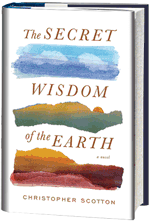
| Publisher: | Grand Central Publishing | |
| Genre: | Fiction, Coming of Age, Family Life, Literary | |
| ISBN: | 9781455551927 | |
| Pub Date: | January 2015 | |
| Price: | $26 |
| Fiction |
by Chris Scotton
Making his debut with an ambitious coming-of-age novel, Christopher Scotton paints a vivid portrait of the Appalachian region and its people. Using their flaws and charms to highlight and shadow, Scotton produces a masterpiece in The Secret Wisdom of the Earth.
Leaving Indiana for Medgar, Kentucky, 14-year-old Kevin Gillooly and his mother try to escape the horror of an accident that took the life of Kevin's younger brother. His mother is nonfunctional with guilt, and Kevin is battling his own trauma, plus the weight of blame from his father for the accident.
Medgar offers Kevin a freedom he hasn't known before and one he desperately needs to survive the suffocation his family's loss has created. He wanders the countryside with his new friend Buzzy Fink, discovering both the beauty and the hostility of a land that means everything to his grandfather, Arthur "Pops" Peebles. As adult Kevin narrates the story, he fondly recalls: "Off we'd go, breaknecking the hills and plundering the hollows where the compounded guilt and grief I felt would fall away like original sin at a baptismal."
Through this small backwoods town in Kentucky, Scotton sketches a rainbow of humanity. Using natural--and often humorous--dialogue, vivid descriptions and authentic behaviors, he populates Medgar with a colorful cast Kevin meets as he assumes the role of assistant to his large animal vet grandfather. While most in Medgar are poor, this is the least of what defines them: "The Finks are poor, but they're proud poor. Esmer runs the hollow hard. Kids stay in school; they truck their garbage out once a week. These are solid people." Contrast them to the Budgets, who "generally don't go to school past the tenth grade; they live off the land, get handouts, and work the mines and odd jobs to make up the rest. They've been living in this hollow for almost one hundred years, marrying each other and having each other's babies. The gene pool is getting a bit shallow."
And with the diversity of people comes an array of issues: racism, hate crimes, poverty and the issue that impacts them all, mountaintop removal.
Coal mining has been a way of life in Medgar for many years, but instead of tunneling into the earth, the coal companies now remove the tops of mountains through explosions, leaving the landscape ripped open and scarred. For some of Medgar's residents, including Pops and Paul Pierce, the town hairstylist, this is a travesty that must be stopped. It's erasing not just the physical land but even the history of Medgar's people: the acid rain created from coal dust erodes the headstones in the graveyards.
One Medgar resident bemoans, "We are talking about mountains that have been here for ten thousand years. Mountains that have defined us for generations... and now three are gone.... they are not coming back.... Ever.'" And Pops points out "People don't care about experts; they care about Betty Dodger being a widow.... They care about black water coming out of the faucets up in Corbin Hollow. They care about their neighbors getting sick from all this crap in the water.'"
As dark as Scotton daubs mountaintop removal onto his picture of Appalachia, Kevin's narrative reveals the other side as well: struggling families who have no other way of making a living in the harsh, elevated landscape. Their mineral rights and land ownership are all they can leverage. Still, Pops and Paul work to rally the Medgar citizens against the mining companies and their devastation of Kentucky's mountains.
The division between the factions intensifies during that summer in 1985. A series of violent crimes rocks the town with more force than the mountaintop explosions and, as the investigation stalls for lack of evidence, Kevin learns the hard truth; in Pop's words, "Evil doesn't have to be loud, son. In fact, it reserves that for the merely boorish. Evil is quiet, stealthy--it sneaks up on you, smiles, and pats you on the back while p*ssing down your leg."
The death of Kevin's brother, the wounding of nature and the crimes that happen in Medgar are all brutally dark and ugly, yet The Secret Wisdom of the Earth is splendid and hopeful. Scotton's undeniable love and awe for this region shine through as he painstakingly portrays strokes of beauty in man and nature, even the mystical in the form of a stunning white stag Kevin encounters in the wild. The belief that everyone can make a difference in even the smallest of efforts shines optimism in the bleakest corners of the novel.
Pops beautifully embodies this kind of humble altruism, as in a lesson he gives Kevin about stocking the "courtesy pile" of firewood at a campsite. Kevin wants to know what happens if people don't do their part and Pops responds,"Well, somebody's gotta be first, don't you think? Just imagine what would happen if we all left a place a little better than we found it.'" This advice carries a multitude of meanings in the book, but it also reflects what Scotton has done with his debut novel. He's left the literary world a little better than he found it. --Jen Forbus
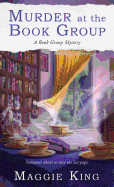
| Publisher: | ||
| Genre: | Fiction, Mystery & Detective, Cozy, Literary, Women Sleuths | |
| ISBN: | 9781476762463 | |
| Pub Date: | December 2014 | |
| Price: | $7.99 |
| Mystery & Thriller |
by Maggie King
Maggie King entertainingly darkens the common perception of book clubs (a benign assembly of readers who've come together to discuss books) in her quirky debut, Murder at the Book Group. The story begins when normally even-keeled, vain Carlene Arness hurls the cozy mystery under discussion into a fireplace. "This book sucks," she exclaims. "There should be a law protecting the reading public from such trash!" The shocked members try to placate irate Carlene, who is also a mystery novelist, then rationally discuss and analyze the plot, which has to do with cyanide slipped into the teacup of an unsuspecting victim.
When the group breaks for refreshments, Carlene suddenly drops dead. Remarkably, her death is deemed the result of cyanide poisoning. When a note is discovered, Carlene's death appears to be a suicide. Many in the group, however, suspect someone killed her and forged the note--or is this kind of thinking the result of having read too many mystery novels? The quest for both who done it and why unearths a host of insidious rivalries and romantic entanglements.
The narrator, Hazel Rose, is a computer programmer turned aspiring romance novelist who cofounded the book club with Carlene. Carlene's death gives Hazel's banal existence a much-needed jolt, but her search for a would-be killer is riddled with snags when Carlene's friends, family and acquaintances offer compelling details of Carlene's multiple identities, surprising secrets and sordid love affairs. The amateur sleuth's pseudo-investigative skills and her interactions with a cast of well-drawn, small-town characters reveal a deception that ultimately coalesces into a study of human nature and the limits of perception. --Kathleen Gerard, blogger at Reading Between the Lines
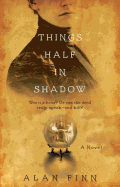
| Publisher: | Gallery Books | |
| Genre: | General, Fiction, Ghost, Thrillers, Occult & Supernatural, Literary | |
| ISBN: | 9781476761725 | |
| Pub Date: | December 2014 | |
| Price: | $16 |
| Mystery & Thriller |
by Alan Finn
A historical superhero is born in the first book of a fascinating proposed series by Alan Finn (pen name for an established mystery writer). Things Half in Shadow blends historical fiction with the contemporary thriller, comic book, mystery and paranormal genres for an entrancing adventure.
Edward Clark, a crime reporter who is secretly the son of a disgraced magician in prison for murder, explains the novel is a "chronicle, or memoir, or whatever you care to call it." He details the high-profile investigation into the 1869 death of Lenora Grimes Pastor, a famous Philadelphia medium murdered during a séance Clark attended. The case alters Clark's existence in ways he never could have imagined.
Finn not only draws on the period's obsession with spiritualism, ghosts and those who speak with the dead but also creates a distinct setting incorporating the Eastern State Penitentiary, destructively muddy and rutted roads, wire bridges and the Underground Railroad. Forensic techniques and investigative practices of the postbellum period combine with the paranormal elements to provide extraordinary suspense. The evil Clark faces is both human and superhuman, which injects action and keeps the pace swift, but it's also subdued by its marriage to spiritualism, preventing the dynamics from becoming unbelievable.
Finn's crack cast is undeniably delightful, and savvy pop culturists will find more than a few allusions to Golden Age comics artfully woven throughout. Many things are in shadow for this series debut, but its high quality isn't one. Bring on the next installment. --Jen Forbus of Jen's Book Thoughts
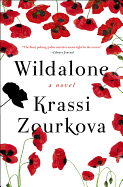
| Publisher: | Morrow | |
| Genre: | Fiction, Romance, Fantasy, Fairy Tales, Folk Tales, Legends & Mythology, Occult & Supernatural, Literary | |
| ISBN: | 9780062328021 | |
| Pub Date: | January 2015 | |
| Price: | $25.99 |
| Science Fiction & Fantasy |
by Krassi Zourkova
Krassi Zourkova's debut novel combines mythology, poetry and eroticism for a series opener that will intrigue fans of Stephenie Meyer, Deborah Harkness and The Vampire Diaries.
The transition from life in her native Bulgaria to her freshman year at Princeton isn't as fluid as piano prodigy and scholarship student Thea Slavin might have hoped. She's scarcely moved into her dorm room when her adviser asks her to be a celebrity pianist's last-minute stand-in at a high-profile recital, where a gorgeous stranger leaves a rose on the stage. This seemingly chance encounter soon propels Thea into the arms of wealthy and cultured Rhys Estin.
Despite Rhys's charisma, his frequent and unexplained absences leave Thea unable to commit fully to him. When she meets his younger brother, Jake, attraction flares between them as well, but Thea didn't come to Princeton for romance. In fact, she didn't come for the piano, either. She's following the footsteps of her much-older sister who attended Princeton, then died and disappeared--in that order. To find out what happened, Thea must delve further into the past than she expected. As she investigates, Thea learns that her sister had a dark obsession, one tied to the myths of ancient Greece and the folktales of Bulgaria about man-killing witches, the samodivi--the "wildalones."
Zourkova weaves a seductive gothic spell that's perfect for a cold winter night. The experience ends all too quickly, but take heart. If the cliffhanger ending is any indication, a sequel is in the offing. --Jaclyn Fulwood, blogger at Infinite Reads
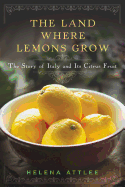
| Publisher: | The Countryman Press | |
| Genre: | Travel, General, Cooking, Europe, Essays & Narratives | |
| ISBN: | 9781581572902 | |
| Pub Date: | January 2015 | |
| Price: | $23.95 |
| Food & Wine |
by Helena Attlee
Traveling to Italy from colder, darker countries, northern Europeans have long been thrilled by the country's sun-soaked warmth and its graceful citrus trees, heavy with luscious fruit. Drawing on her long acquaintance with the Mediterranean country, British gardening historian Helena Attlee tells the convoluted story of Italy's citrus industry in The Land Where Lemons Grow.
Starting with the Medici family and other wealthy Renaissance collectors of citrus trees, Attlee delves into the fruit's history and particulars: its many varieties, its peculiar naming conventions, the precise growing conditions required by certain finicky produce. She interviews growers all over the country, paying particular attention to Sicily and the island's deep, tangled connections between citrus cultivation and organized crime.
Attlee's prose evokes the sharp, zesty flavors of her subject: familiar lemons and oranges, yes, but also the more exotic citrons and bergamots. She details the many uses of citrus flesh, juice and peel--culinary, of course, but also cosmetic and pharmaceutical. Attlee roams the length of Italy in pursuit of citrus lore, visiting ancient growing sites and working orchards at harvest time--even participating in Ivrea's annual Battle of the Oranges (in which citizens pelt each other with fruit). Sprinkled throughout the text are citrus-centric recipes, gathered from the farmers, historians and restaurateurs who have dedicated their lives to the "curious fruit."
Though the botanical information can get a bit technical, this fascinating history will have readers scouring their local markets for plump lemons and juicy oranges. --Katie Noah Gibson, blogger at Cakes, Tea and Dreams
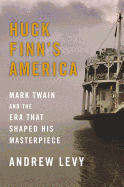
| Publisher: | Simon & Schuster | |
| Genre: | Literary Criticism, General, Children's Studies, Books & Reading, Biography & Autobiography, Social Science, American, Literary | |
| ISBN: | 9781439186961 | |
| Pub Date: | December 2014 | |
| Price: | $25 |
| Essays & Criticism |
by Andrew Levy
Ernest Hemingway famously said that The Adventures of Huckleberry Finn is the "best book we've had." Here Andrew Levy--author of The First Emancipator, about slavery in 18th-century America--has added to the scrutiny this classic book has received over the years. His focus in Huck Finn's America: Mark Twain and the Era that Shaped His Masterpiece is, as the subtitle suggests, "a cultural biography of Twain in his era." To Levy, context is everything; according to him, we've been misreading the book for years.
He starts by looking at the less-than-stellar reception the novel got when it was published in 1885 (20 years after the Civil War ended). The New York World called it "cheap and pernicious stuff." The reviews said little about race relations, but a lot about the "matter of children." The U.S. then was preoccupied with youth violence, uncivilized bad boys and poor parenting; readers immediately recognized in Huck another poor, lonely, truant boy who smoked. Levy argues that this historical context allows for a more complex, nuanced reading of Huck's character.
Levy uncovered another overlooked aspect when he was researching the "Twins of Genius" tour that Twain and fellow writer George Washington Cable took across the country. Public performances (including minstrel shows) were all the rage, and blackness as a part of popular culture deeply interested Twain. Levy concludes that Twain's America of the late 19th century--with the public concerned about the treatment of children and the treatment of black people--looks "uncannily like our own." This intriguing, thoroughly researched book asks us to read Huck Finn anew, an exercise worth undertaking. --Tom Lavoie, former publisher
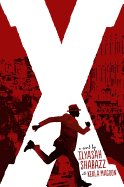
| Publisher: | Candlewick | |
| Genre: | People & Places, Prejudice & Racism, Social Issues, Juvenile Fiction, Historical, United States - 20th Century, United States - African-American | |
| ISBN: | 9780763669676 | |
| Pub Date: | January 2015 | |
| Price: | $16.99 |
| Starred | Children's & Young Adult |
by Ilyasah Shabazz, Kekla Magoon
Malcolm X's third daughter, Ilyasah Shabazz (Growing Up X), and Kekla Magoon (The Rock and the River) team up for a riveting first-person narrative based on the childhood and adolescence of Malcolm Little, who grew up to become Malcolm X.
The authors follow Malcolm from his childhood home in 1930s Lansing, Mich., through his move as a teenager to his half-sister Ella's home in Boston, to becoming a numbers runner in Harlem, and his later imprisonment for theft. It ends with his opening up to the teachings of the Nation of Islam: "This place. These walls. They don't contain me," he says. The authors describe how Malcolm's early desperation led to a feeling of entitlement, once he was exposed to the high life in the Roxbury section of Boston. He works his way from shoeshine boy at Roseland Ballroom to dancing on the floor himself--and catching the eye of a sexy white woman named Sophia. Readers will sense trouble brewing even as sparks fly between them.
Although this is a work of fiction, it's strongly tethered to the facts, to the people and events that contributed to Malcolm's world view and his path to becoming a leader. Shabazz's endnotes indicate what's true and where she took artistic license. Malcolm's voice is often funny, always perceptive, and as appreciative of beauty as he is critical of the disparity between the rights of whites and blacks. This novel leads fluidly into The Autobiography of Malcolm X, for those wishing to know more of this remarkable man's journey. --Jennifer M. Brown, children's editor, Shelf Awareness
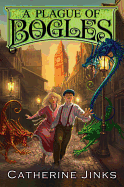
| Publisher: | Houghton Mifflin Harcourt | |
| Genre: | Mysteries, Espionage, & Detective Stories, Fantasy & Magic, Action & Adventure, Juvenile Fiction, Europe, Historical, Monsters | |
| ISBN: | 9780544087477 | |
| Pub Date: | January 2015 | |
| Price: | $16.99 |
| Children's & Young Adult |
by Catherine Jinks
It's 1870, and London is overrun with bogles. So much so that Alfred Bunce, the resident Go-Devil Man from How to Catch a Bogle--who changed abodes so he could live a quiet life--re-enters the field in this fast-paced follow-up.
Alfred can kill bogles with a spear and a circle of salt. Jem Barbary knows that Alfred doesn't want to bogle anymore. But Mabel Lillimere says a bogle ate her scullery maid. Then Hugh Purdy fears a bogle on his roof. Mr. Froome's bogle inhabits the church crypt, and Mrs. Kerridge's bogle haunts the boys' school. All of them appeal to Jem to track down the bogle-catchers, and Jem knows if Alfred doesn't get rid of the monsters, more kids will die. A one-time thief and pickpocket, Jem wants to be a bogler's apprentice--just like Birdie McAdam used to be, before Miss Eames took her in and dressed her up real fancy. A bogler's apprentice can walk with "a swagger in his step" and "a steady wage in his pocket." But bogles eat children, and the job of an apprentice is to act as bait, all the while keeping his wits and staying out of harm's way.
With the help of Alfred, Birdie and Miss Eames, Jem needs to find out what's going on, and quickly, before he loses his nerve. With plenty of action and lively storytelling, this companion book neatly wraps up current problems, while keeping readers hooked and waiting for the third book. --Lynn Becker, host of Book Talk, the monthly online discussion of children's books for the Society of Children's Book Writers & Illustrators